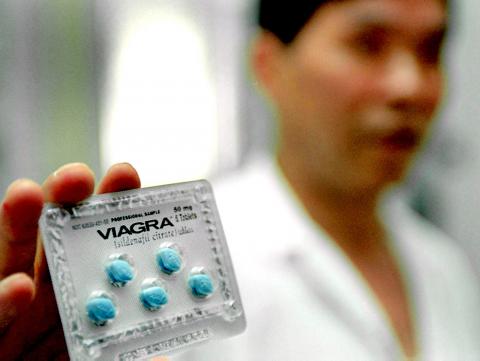Twenty years ago, a little blue pill called Viagra unleashed a cultural shift in America, making sex possible again for millions of older men and bringing the once-taboo topic of impotence into daily conversation.
While the sexual improvement revolution it sparked brightened up the sex lives of many couples, it largely left out women still struggling with dysfunction and loss of libido over time. They have yet to benefit from a magic bullet to bring it all back, experts say.
About 65 million prescriptions have been filled worldwide for the blockbuster Pfizer drug approved by the US Food and Drug Administration on March 27, 1998.

Photo: AFP
It was the first pill aimed at helping men get erections.
Suddenly, talk of an amazing drug that could make an older man’s penis hard again was all over television and magazines.
The Viagra boom also coincided with the rise of the internet, and the explosion of online pornography.

Photo: AFP
Ads for Viagra were designed to reframe what had been known as “male impotence” as “erectile dysfunction” or ED, a medical condition that could finally be fixed.
Republican senator, military veteran and one-time presidential candidate Bob Dole became the first television spokesman for Viagra, admitting his own fears about erectile dysfunction to the masses. “It’s a little embarrassing to talk about ED, but it is so important for millions of men and their partners,” he said. The strategy worked.
Before Viagra, men wanted to talk about their erectile problems, and did, but the conversations were awkward and difficult, recalled Elizabeth Kavaler, a urology specialist at Lenox Hill Hospital in New York.
“Now, sexuality in general is very out there,” she added.
“Sex has become an expected part of our lives as we age. And I am sure Viagra has been a big part of that.”
‘THANKS, VIAGRA’
Viagra has had a “major impact” — on a par with the way antibiotics changed the way infections are treated, and how statins became ubiquitous in the fight against heart disease, said Louis Kavoussi, chairman of urology at Northwell Health, a New York-area hospital network.
Viagra’s release also came amid a “sort of a clampdown on physicians interacting with companies,” he said.
“So this was a perfect medicine to advertise to consumers. It was a lifestyle type of medicine.”
Viagra, or sildenafil citrate, was first developed as a drug meant to treat high blood pressure and angina. But by 1990, men who took part in early clinical trials discovered its main effect was improving their erections, by boosting blood flow to the penis.
For all its popularity, Viagra is still often misunderstood.
“It isn’t an aphrodisiac,” said Kavoussi.
“A lot of men who ask about it say, ‘My wife isn’t very interested in relations,’” he added.
“And I say, ‘Viagra is not going to change that.’”
In 2000, the comedy show Saturday Night Live featured a spoof on ads that showed sexually satisfied men saying, “Thanks, Viagra.”
In it, one eye-rolling actress after another was featured groaning “Thanks, Viagra,” as a horny male partner groped her from behind or gripped her in a slow-dance.
The skit was funny because it reflected a reality few people were talking about.
“We are a very puritanical society, and I think Viagra has loosened us up,” said Nachum Katlowitz, director of urology and fertility at Staten Island University Hospital. “But for the most part, the women have been left out of the sexual improvement revolution.”
Pfizer finally did include women in its marketing for Viagra, in 2014. The commercials featured sultry women, including at least one with a foreign accent, speaking directly to the camera, telling men to get themselves a prescription.
‘FEMALE VIAGRA’ FLOPS
In 2015, the FDA approved a pill called Addyi (flibanserin), which was cast in the media as the “female Viagra,” and was touted as the first libido-enhancing pill for women who experienced a loss of interest in sex.
The pill was controversial from the start. A kind of anti-depressant, women were warned not to drink alcohol with it. It also cost hundreds of dollars and came with the risk of major side effects like nausea, vomiting and thoughts of suicide.
“It didn’t go over too big,” said Katlowitz.
Valeant Pharmaceuticals bought Addyi for US$1 billion in 2015, but sold it back to the developer, Sprout Pharmaceuticals, at a steep discount last year.
Older women’s main problem when it comes to sex is vaginal dryness that accompanies menopause, and can make sex painful. Solutions tend to include hormones, or laser treatments that revitalize the vagina. They are just beginning to grow in popularity, but still cost hundreds to thousands of dollars, said Kavaler.
“We are at least 20 years behind men,” she said.
For Katlowitz, Viagra was a prime example of “the greed of the pharmaceutical industry.”
Viagra cost about US$15 per pill when it first came out, and rose to more than US$50. It finally went generic last year, lowering the price per pill to less than US$1.
“There was absolutely no reason to charge US$50 a pill,” said Katlowitz. “It was just that they could, so they did.”

Jan 13 to Jan 19 Yang Jen-huang (楊仁煌) recalls being slapped by his father when he asked about their Sakizaya heritage, telling him to never mention it otherwise they’ll be killed. “Only then did I start learning about the Karewan Incident,” he tells Mayaw Kilang in “The social culture and ethnic identification of the Sakizaya” (撒奇萊雅族的社會文化與民族認定). “Many of our elders are reluctant to call themselves Sakizaya, and are accustomed to living in Amis (Pangcah) society. Therefore, it’s up to the younger generation to push for official recognition, because there’s still a taboo with the older people.” Although the Sakizaya became Taiwan’s 13th

Earlier this month, a Hong Kong ship, Shunxin-39, was identified as the ship that had cut telecom cables on the seabed north of Keelung. The ship, owned out of Hong Kong and variously described as registered in Cameroon (as Shunxin-39) and Tanzania (as Xinshun-39), was originally People’s Republic of China (PRC)-flagged, but changed registries in 2024, according to Maritime Executive magazine. The Financial Times published tracking data for the ship showing it crossing a number of undersea cables off northern Taiwan over the course of several days. The intent was clear. Shunxin-39, which according to the Taiwan Coast Guard was crewed

China’s military launched a record number of warplane incursions around Taiwan last year as it builds its ability to launch full-scale invasion, something a former chief of Taiwan’s armed forces said Beijing could be capable of within a decade. Analysts said China’s relentless harassment had taken a toll on Taiwan’s resources, but had failed to convince them to capitulate, largely because the threat of invasion was still an empty one, for now. Xi Jinping’s (習近平) determination to annex Taiwan under what the president terms “reunification” is no secret. He has publicly and stridently promised to bring it under Communist party (CCP) control,

One way people in Taiwan can control how they are represented is through their choice of name. Culturally, it is not uncommon for people to choose their own names and change their identification cards and passports to reflect the change, though only recently was the right to use Indigenous names written using letters allowed. Reasons for changing a person’s name can vary widely, from wanting to sound more literary, to changing a poor choice made by their parents or, as 331 people did in March of 2021, to get free sushi by legally changing their name to include the two characters